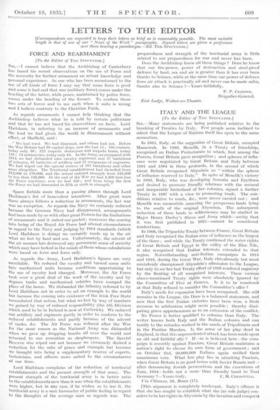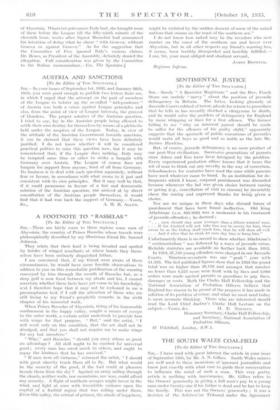ITALY AND THE LEAGUE
[To the Editor of THE SPECTATOR.] Sin,—Many statements are being published relative to the breaking of Treaties by Italy. FeW people seem inclined to admit that the League of Nations itself lies open to the same accusation.
In 1885, Italy, at the suggestion of Great Britain, occupied Massowah. In 1889, Menelik, in a Treaty of friendship, recognised an Italian Protectorate to which, first among the Powers, Great Britain gave recognition ; and spheres of influ- ence were negotiated by Great Britain and Italy between ' 1891 and 1894 in three protocols, in the second of which • Great, Britain recognised Abyssinia as within the sphere • of' influence reserved to Italy." In spite of Menelik's victory' in 1896, Italy, who was developing Somalia and Erythrea and desired to promote friendly relations with the natural and inseparable hinterland .of her colonies, signed a further' Treaty in 1897 with a view to promoting trade, The eon- ' ditions relative to roads, &c., were never carried out ; and Menelik was meanwhile annexing the prosperous lands lying to the south of the original Abyssinia. The subsequent reduction of these lands to wildernesses may be studied in Major Henry Darley's Slaves and „Ivory which—seeing that it was first published in 1925—cannOt be considered tendentious.
In 1906, the Tripartite Treaty between France, Great Britain and Italy recognised the Italian zone of influence as the largest of the three ; and while the Treaty confirmed the water rights of Great Britain and Egypt in the valley of the Blue Nile, it also recognised that Italian interests extended to that region. Notwithstanding anti-Italian campaigns in 1915 and 1916, during the Great War, Italy chivalrously but most mistakenly championed Abyssinia's admission to the League, ' but only to see her last Treaty effort of 1928 rendered nugatory by the flouting of all recognised interests. These various ' above-mentioned Treaty rights were absolutely ignored by the Committee of Five at Geneva. Is it to be wondered at that Italy refused to consider the Committee's offer ?
Italy's needs for expansion have been recognised. She still remains in the League, the Duce is a balanced statesman, and now that the first Italian victories have been won, a fresh • recourse to arbitration might seem possible ; thereby dissi- pating grave apprehensions as to an extension of the conflict,
No Power is better qualified to colonise than Italy. The writer knows both Italy and the Italian colonies and can testify to the miracles, worked in the sands of Tripolitania and in the Pontine Marshes. Is the sense of fair play 'dead in England, in that this unprecedented attack has been made upon an old and laithful ally `1 If—as is believed here—the cam- paign is covertly against Fascism, Great Britain maintains a nation's right to choose its own form of government ; and on October 2nd, 20,000,000 Italians again ratified their unanimous vote. What fair play lies in attacking Fascism, when Great Britain is on good terms with Soviet Russia and— after denouncing Jewish persecutions and the executions of June, 1934—holds out a more than friendly hand to Nazi Germany ?—Yours truly, C. M. CRESWELL. ' Via Clitunno, 38, Roma (17).
[This argument is completely irrelevant. Italy's offence is that she has sought' to establish what she (as sole judge) eon- eiders to be her rights in Abyssinia by the invasion and conqueSt
of Abyssinia. Whatever grievances Italy had, she brought none of them before the League till the fifty-ninth minute of the eleventh hour, weeks after Signor Mussolini had announced his intention of doing what he chose " with Geneva, without Geneva or against Geneva." As for the suggestion that the Committee of Five ignored Italy's various claims, Dr. Benes, as President of the Assembly, definitely denied the allegation. Full consideration was given by the Committee, to the Italian memorandum.—Eo. The Spectator.]



























































 Previous page
Previous page